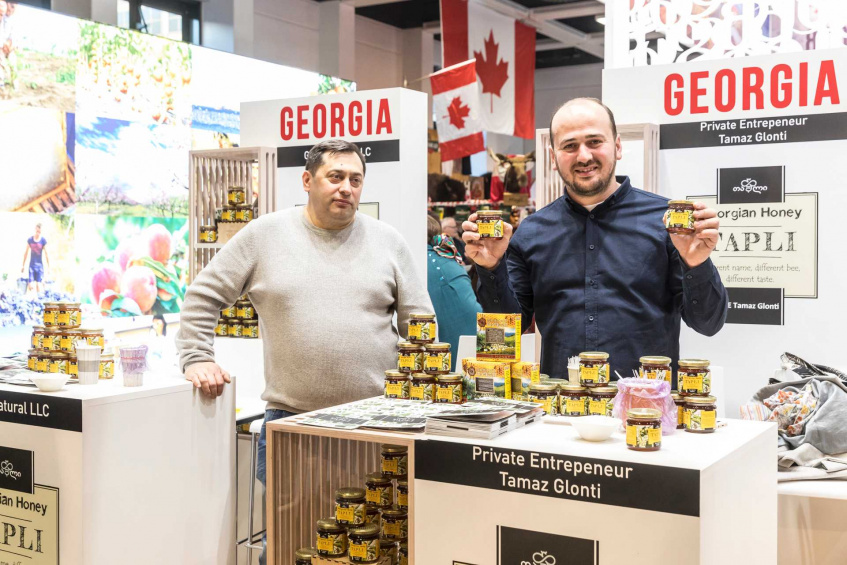
Two Georgian honey producers are presenting their products at the International Green Week (IGW), a one-of-a-kind annual international exhibition of the food, agriculture and gardening industries in Berlin on 18-27 January, 2019. Georgia will be featured by a range of products at the fair this year, but it is the first time that European consumers and trade visitors will have a chance to try Georgian honey, which is entering European market under the ‘TAPLI’ brand name - that is Georgian for honey.
The Georgian stand at IGW is organised by the Ministry of Environmental Protection and Agriculture of Georgia, which has also developed the TAPLI brand with support from the European Union and German government. The brand identifies a premium Georgian honey – only those honey producers who comply with state-of-the-art beekeeping practices and respect the highest food safety standards can claim the TAPLI logo on jars containing their produce. The first batch of Georgian honey under the TAPLI branding is provided by two Georgian producers - Geo Naturali Ltd and private entrepreneur Tamaz Glonti.
Creation of the TAPLI branding was preceded by a rigorous effort to develop export capacities of Georgian honey that took place in the framework of EU4Business project 'SME Development and DCFTA in Georgia', implemented by GIZ. It started two years ago with mobilisation of leading German expertise that helped assess the honey sector, conduct an in-depth study of existing beekeeping practices and facilities, as well as the government’s surveillance infrastructure and capacities. A mapping of honey producers and analysis of samples of Georgian honey was carried out at a leading international laboratory.
“Development of the beekeeping sector and export capacities for Georgian premium honey that complies with European food safety requirements is a priority. As a key stakeholder, the Ministry has been actively engaged from day one in this initiative with the representatives of EUD and GIZ in Georgia. As a result of this close collaboration, we have a comprehensive programme of targeted assistance, which includes guidelines for Georgian beekeepers on good practices and export oriented high-quality honey production,”said Levan Davitashvili, Minister of Environmental Protection and Agriculture of Georgia who is also attending IGW fair as head of the Georgian delegation.
“This has been quite an arduous process with many aspects we had to tackle along the way. While we had theoretical knowledge of the standards and procedures to be put in place, it would have been impossible to apply them without the support from the project,” says beekeeper Giorgi Iashvili, adding that the technical expertise made available to them through the project helped his company identify shortcomings and only after that focus on development of honey for export. Giorgi Iashvili is a Racha-native beekeeper, founder of Geo Naturali Ltd. He is producing honey in partnership with his fellow beekeepers of the Racha Natural Products cooperative.
Beekeeper Tamaz Glonti is a native of Aketi village in Georgia’s Guria region and has been practicing beekeeping there for almost 30 years. He has passed on his love of apiculture to his children: his son Vakhtang is now one of Georgia’s leading professionals for organic apiculture.
Both producers define their product as a high-quality natural honey produced in ecologically clean environment.
“This is the first case of Georgian honey reaching the European market and our participation in the IGW fair provides us with a unique opportunity to establish international business contacts,”says Vakhtang Glonti.
International Green Week, also called ‘The Davos of Agribusiness’, brings together over 1,700 exhibitors with over 100,000 products from all over the world. This is the place where 300 technical conferences and other events are held with participation of the food industry representatives, wholesalers, retailers, caterers, agricultural importers, agricultural policy and sectoral experts. Most importantly, participation in the fair provides a unique marketing opportunity for the producers as it is visited by around 400,000 people, trade visitors included.
The 'SME Development and DCFTA in Georgia' project assists Georgian small and medium-sized enterprises (SMEs) to become more competitive and adapt to the new regulatory environment created under the EU Deep and Comprehensive Free Trade Agreement (DCFTA). The project is part of European Union's EU4Business Initiative, which brings together all EU programmes assisting SME and private sector development in Georgia. EU4Business enables the private sector to take advantage of the opportunities offered by DCFTA, which gives Georgia access to a common market of 500 million consumers.
